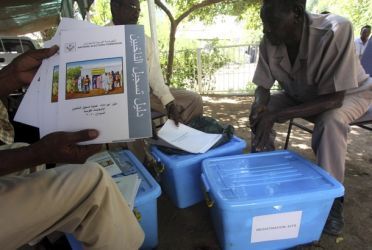Human Rights Watch calls for more election observers in Sudan
January 24, 2009 (WASHINGTON) – The New York-based Human Rights Watch today issued a paper saying that violations of political and civil rights by Sudanese security forces are undermining the prospects of a free and fair election in April 2010. The rights group called for more international elections observers as one way to address these concerns.

HRW’s brief new report is called “Sudan: Abuses Undermine Impending Elections.” Aside from reporting and commenting on the violent crackdowns on the SPLM-led rallies in December 2009, the rights group also writes on some less documented human rights violations from other regions of the country.
During election registration in November and early December, in northern Sudan, security forces arbitrarily arrested members and election observers of opposition political parties and activists. In one example from South Darfur, national security forces beat and arrested an election observer and detained him without charge for 25 days, according to HRW.
In Southern Sudan, Human Rights Watch researchers who visited in November and December found that southern soldiers and police arbitrarily arrested, detained, and mistreated members of political parties opposed to the southern ruling Sudan People’s Liberation Movement (SPLM). In Aweil, for example, HRW stated that authorities arrested Tong Lual Ayat, head of the United Democratic Party, on October 22, supposedly for not having properly registered his party. They detained him in a safe house for two weeks, and then transferred him to a military barracks, chaining him to a tree and holding him for another 16 days.
“Authorities in Southern Sudan should immediately end their arrests of people simply for their membership in a political party,” said Gagnon.
HARRASMENT OF ELECTION OBSERVERS AND OPPONENTS
Human Rights Watch claimed that political parties’ election observers were subjected to restrictions on their freedoms of movement and speech, particularly when they complained of actions by ruling NCP members and members of ‘popular committees’, which are groups of local leaders who certify residency.
In November and December, the government either cancelled, denied permission for, or interrupted at least two training sessions on election monitoring in Kassala, eastern Sudan; two public meetings in Kosti, White Nile state; a public speech in support of an independent presidential candidate in Khartoum; and dozens of public rallies.
On November 8 at a Khartoum registration center, a police officer beat a female student member of the Communist Party when she refused to surrender her voter registration card to the popular committee. Two days later, security forces detained an Umma Party observer who complained that ruling party members were misrepresenting themselves as elections officials, and had improperly collected voter registration cards.
In South Darfur, authorities arrested and detained a Communist Party observer, Tayfour Elamin Abdullah, for 25 days when he told people at a voter registration center they should not give their registration cards to the ruling party. Abdullah told Human Rights Watch that security officials beat him in custody and told him to leave the Communist Party.
“More broadly, the Sudanese government has harassed, assaulted, and arbitrarily arrested human rights activists who speak out about elections, Darfur, or other sensitive topics,” said HRW.
On December 6, national security forces assaulted two student activists for distributing fliers with anti-Bashir messages and to promote voter registration in a public park in Khartoum. The security officers beat them and detained them for several hours. On November 22, security forces arrested an elderly man when he was at the hospital for diabetes treatment because he had fliers from the same group.
Dozens of Darfuri student activists remain in detention. Abdelmajeed Salih, a well known Darfuri activist who has spoken out about Darfur and international justice and who had been in detention without charge since August, was released January 16. He told Human Rights Watch that on August 28 a group of armed national security officers approached him and his friend in Khartoum, beat them with the backs of their guns, then detained them.
“During the first five days they were very aggressive, hitting me with tubes and planks of wood until I lost consciousness and they brought me to a doctor,” he told HRW. “They were shouting in my face that I am a traitor and spying for foreign countries.”
At least four members of the United Popular Front, a student group affiliated with the Abdel Wahid faction of the Sudan Liberation Army, which has publicly supported the ICC arrest warrant for al-Bashir, have been held without charge since April. One member of the group, arrested in early October in Hasahisa, al Gezira state, was held for 13 days and severally beaten before being released. On October 25, security forces arrested a Darfuri student leader at Khartoum University for organizing a demonstration protesting school fees. After subjecting him to intense interrogation and beating, they dropped him in a public park at 2 a.m.
“With less than three months to elections and with campaigning season starting in February, a robust international observer presence is needed now. Careful monitoring is even more pressing considering that al-Bashir is wanted for war crimes,” said Gagnon in a press statement.
The European Union thus far has declined to agree to a request from Special Envoy Scott Gration to send upwards of 300 election monitors. In its report HRW took note that “Currently, the [US-based] Carter Center is the only international observation mission in Sudan.”
(ST)
